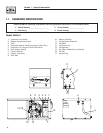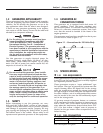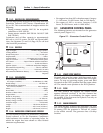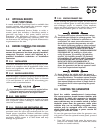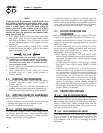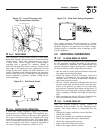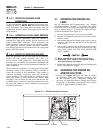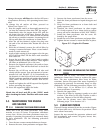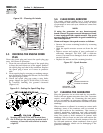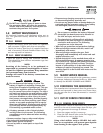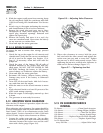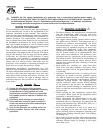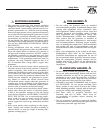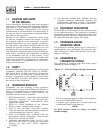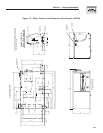
12
Section 3 – Maintenance
Recreational Vehicle Generator
Figure 3.3 – Cleaning Air Intake
USTC
3.5 CHECKING THE ENGINE SPARK
PLUG
Clean the spark plug and reset the spark plug gap
every 100 hours of operation.
1. Clean the area around the base of the spark plug
to keep dirt and debris out of the engine. Remove
the spark plug and check the condition. Replace
the spark plug if worn or if reuse is question-
able.
2. Clean spark plug by scraping or washing using a
wire brush and commercial solvent. Do not blast
the spark plug to clean.
3. Check the spark plug gap using a wire feeler
gauge. Adjust the gap to 0.030 inch (0.76 mm)
by carefully bending the ground electrode
(Figure 3.4).
Figure 3.4 – Setting the Spark Plug Gap
Sparking can occur if the wire terminal does
not fit firmly on the spark plug terminal end. If
necessary, re-form the wire terminal to obtain
a tight fit.
3.6 CLEAN SPARK ARRESTOR
The engine exhaust muffler has a spark arrestor
screen. Inspect and clean the screen every 50 hours
of operation or once each year, whichever comes first
(Figure 3.5).
NOTE:
If using the generator on any forest-covered,
brush-covered or grass-covered unimproved land,
it must equipped with a spark arrestor. The spark
arrestor must be maintained in good condition by
the owner/operator.
Clean and inspect the spark arrestor as follows:
• Remove the screen retaining bracket by removing
the screw.
• Slide the spark arrestor screen out from the tail
pipe.
• Inspect screen and replace if torn, perforated or
otherwise damaged. DO NOT USE a defective
screen. If screen is not damaged, clean it with com-
mercial solvent.
• Replace the screen and the retaining bracket.
Figure 3.5 - Spark Arrestor
RETAINING
SCREW P/N 056892
SPARK ARRRESTOR
SCREEN P/N 089680
TAILPIPE
P/N 0E0683
3.7 CLEANING THE GENERATOR
Keep the generator set as clean and dry as possible.
Protect the unit against excessive dust, dirt, corrosive
vapors, road splash, etc. Permitting dirt and mois-
ture to accumulate on generator windings will have
an adverse effect on the insulation resistance of those
windings.
When moisture is allowed to remain in contact with
windings, some of the moisture will be retained in
voids and cracks in the insulation. This causes a
reduced insulation resistance and will eventually
cause problems. Dirt will make the problem worse,
since dirt tends to hold moisture in contact with
windings. Salt (as from sea air) also will worsen the
problem since it tends to absorb moisture from the
air. Salt and moisture, when combined, form a good
electrical conductor which can be damaging to the
generator windings.



